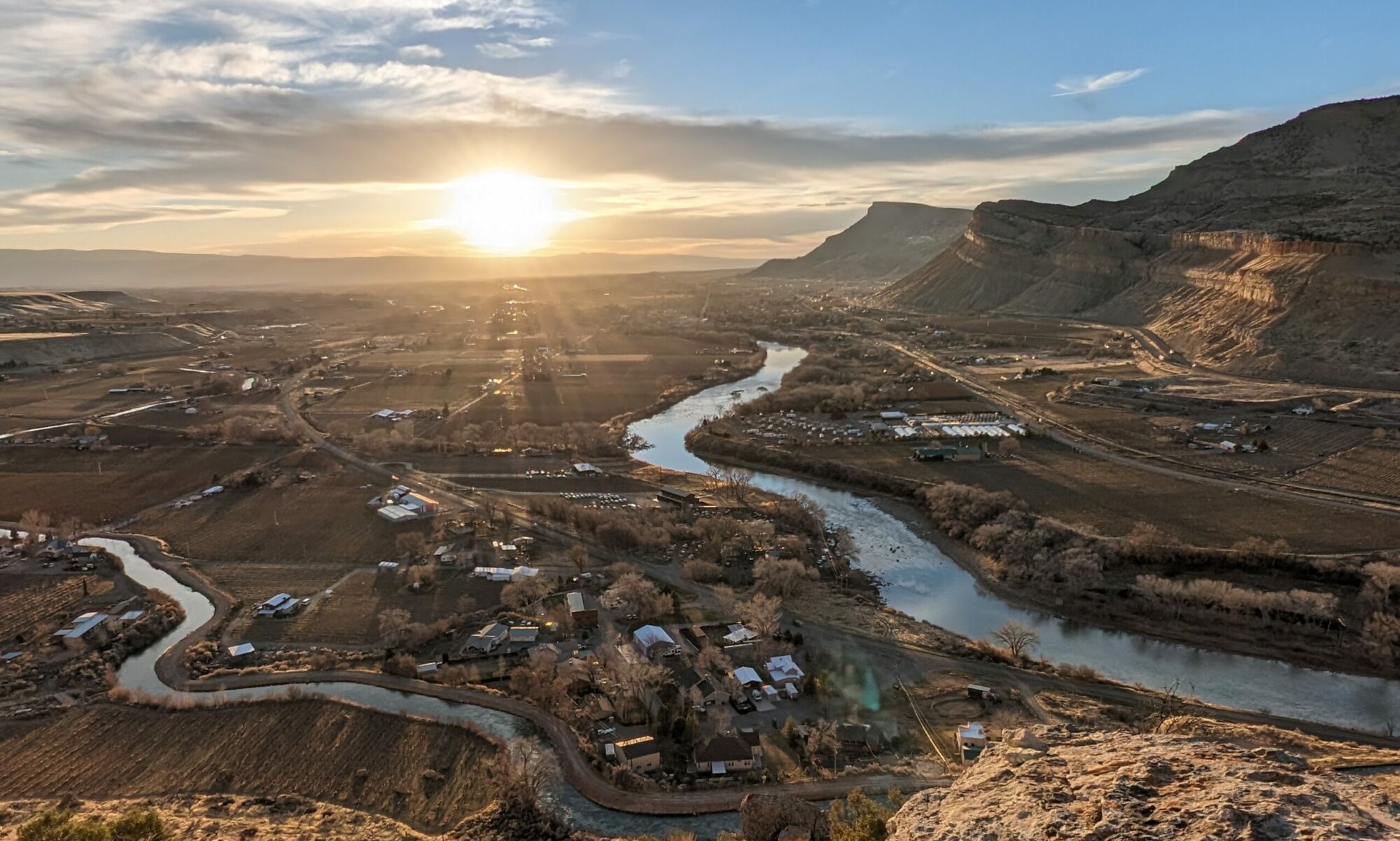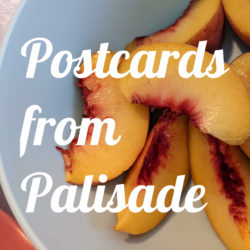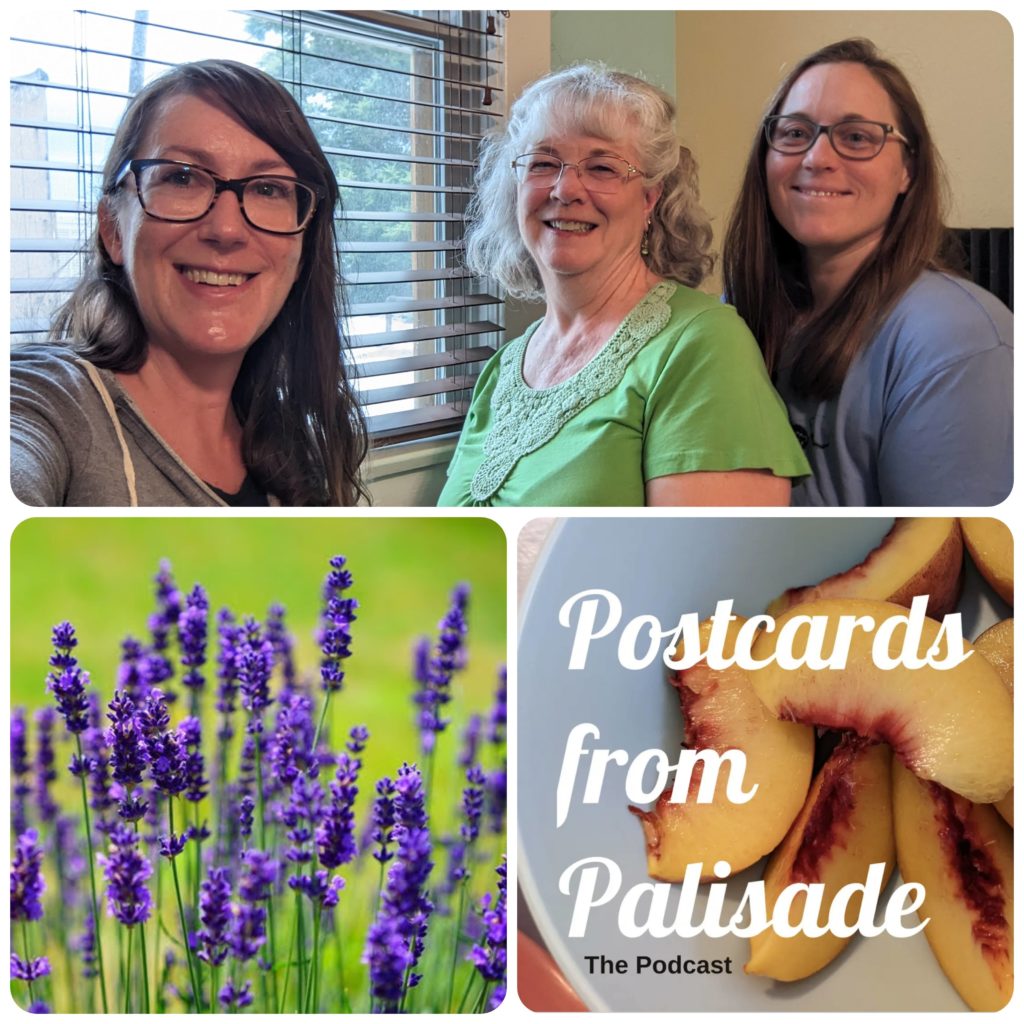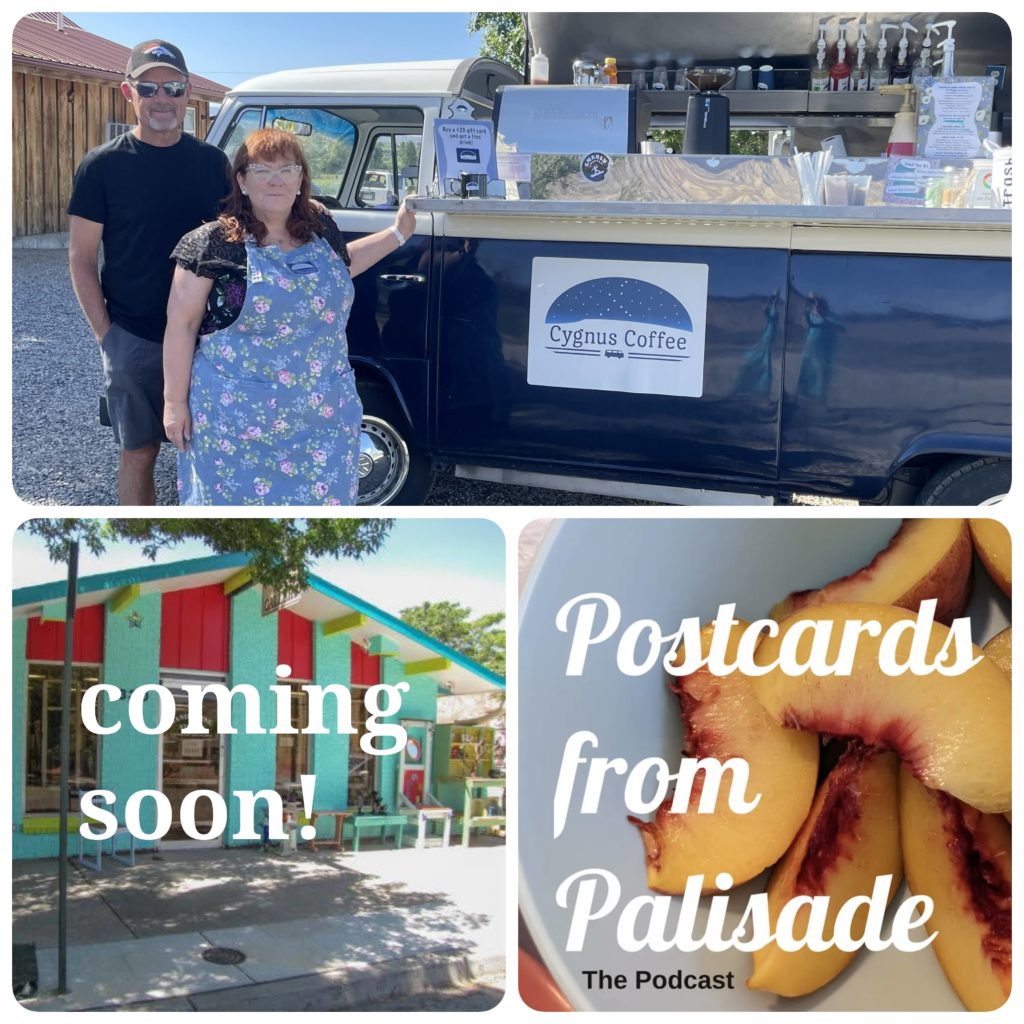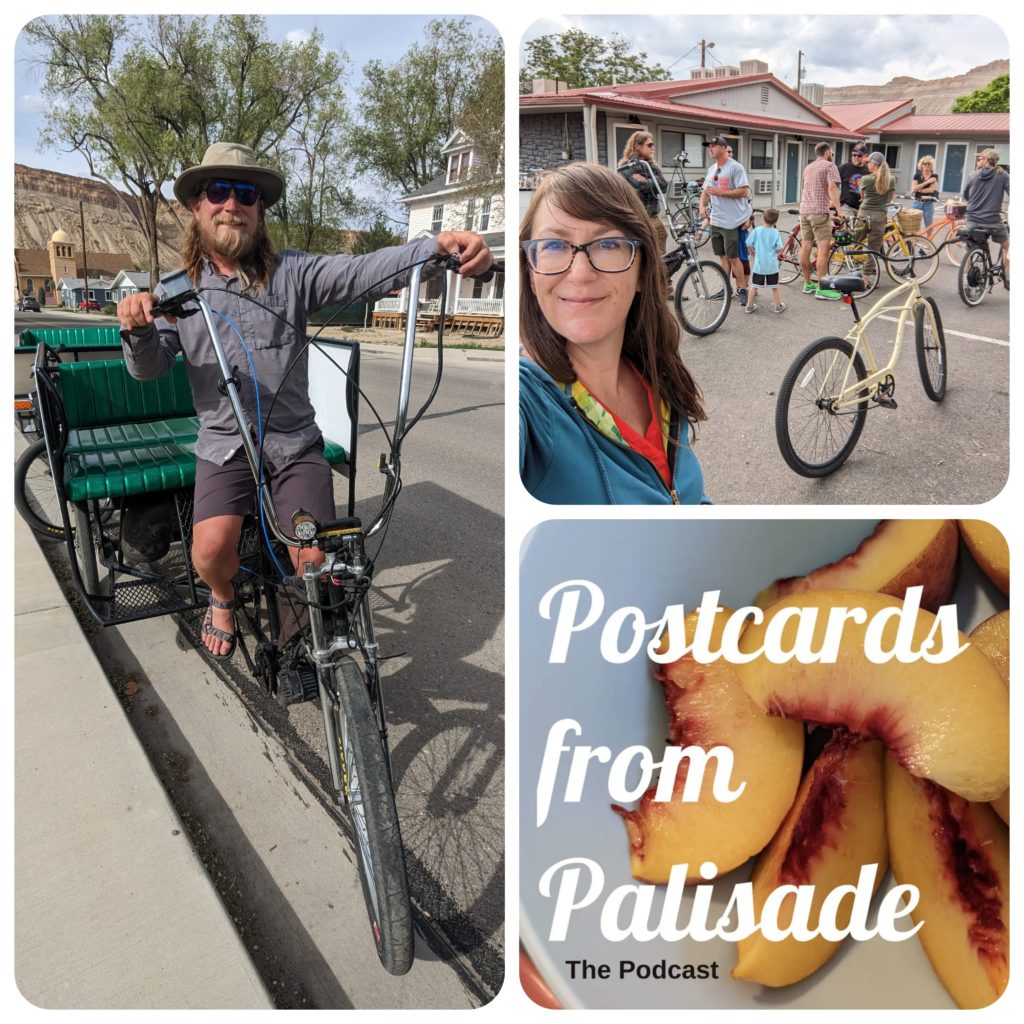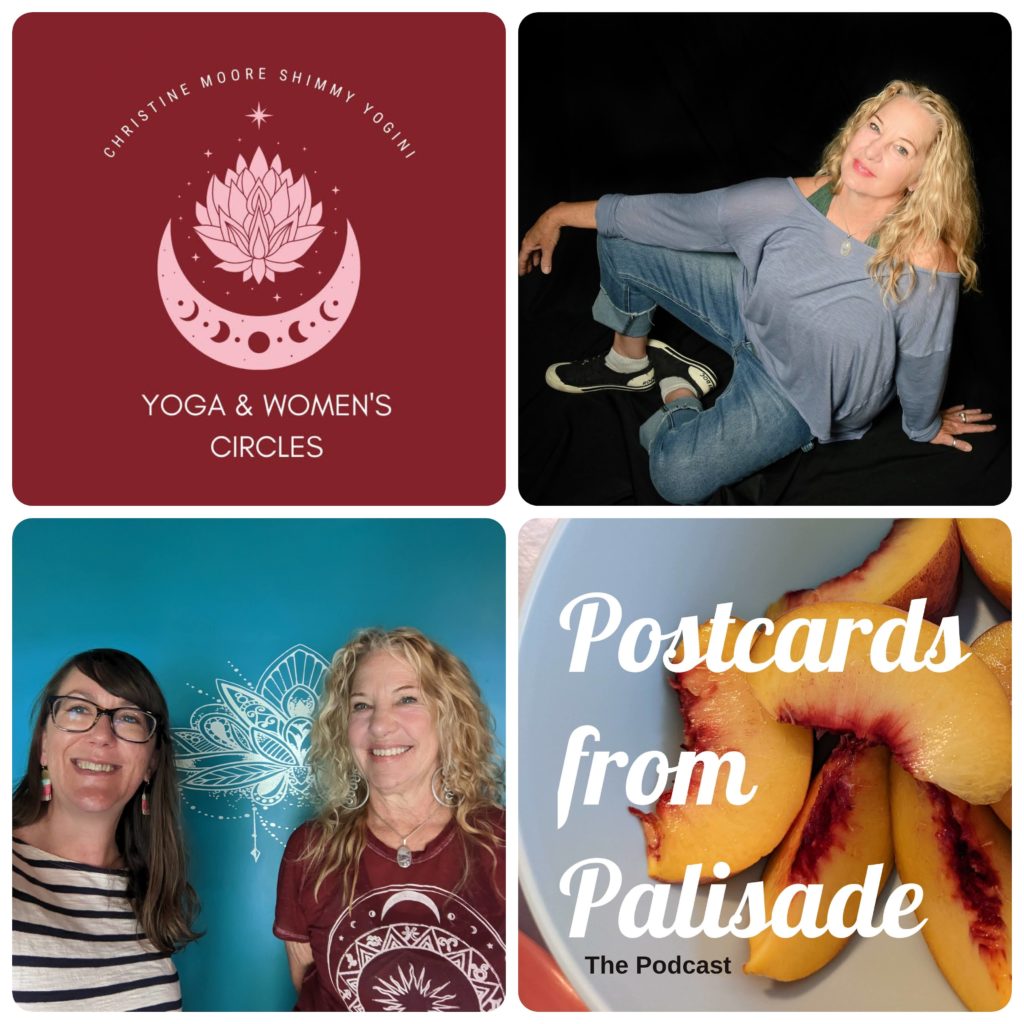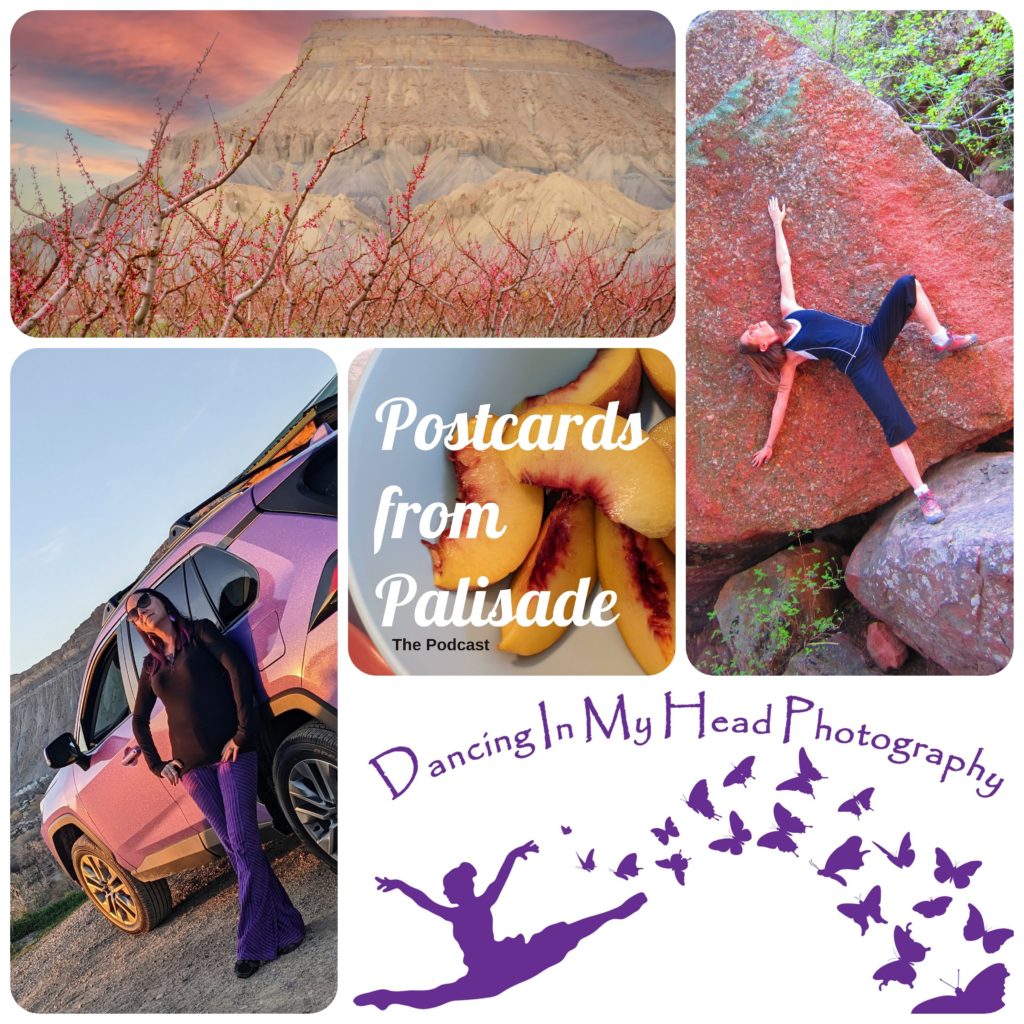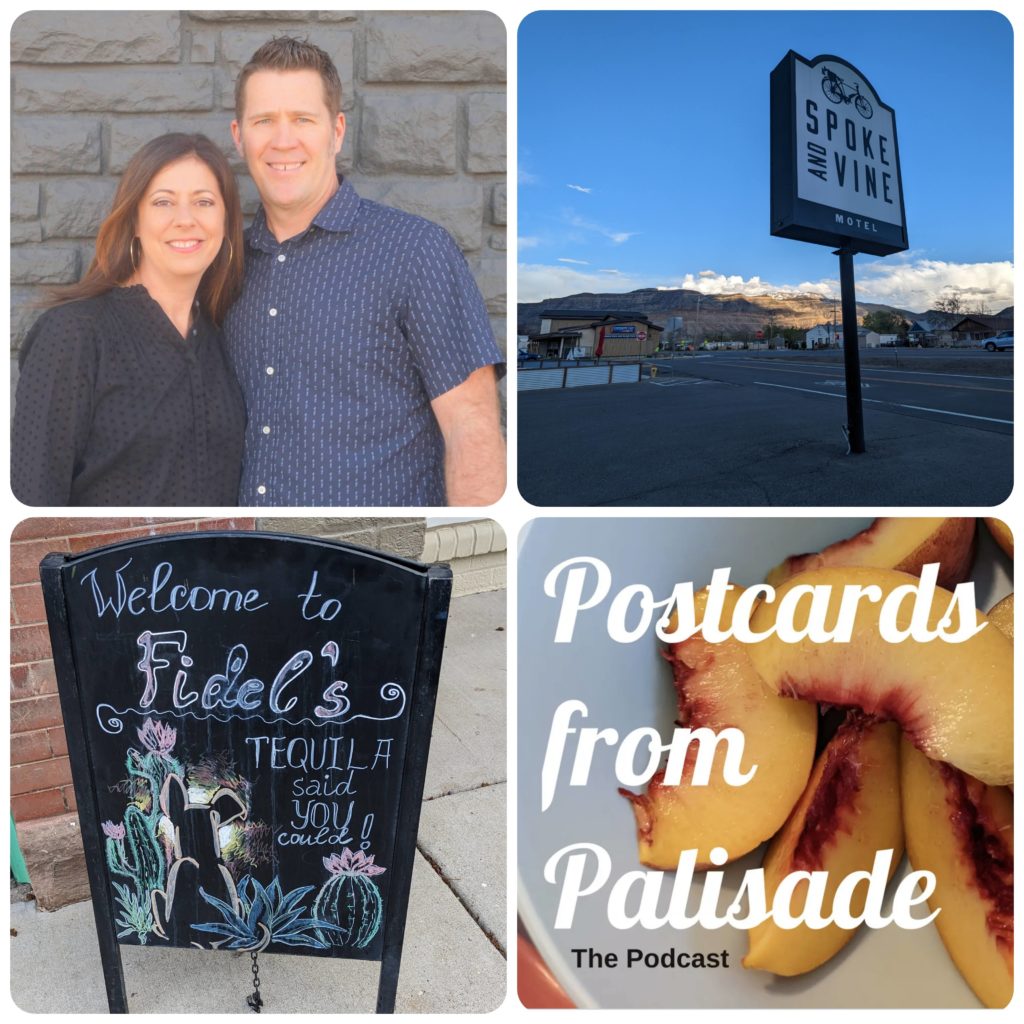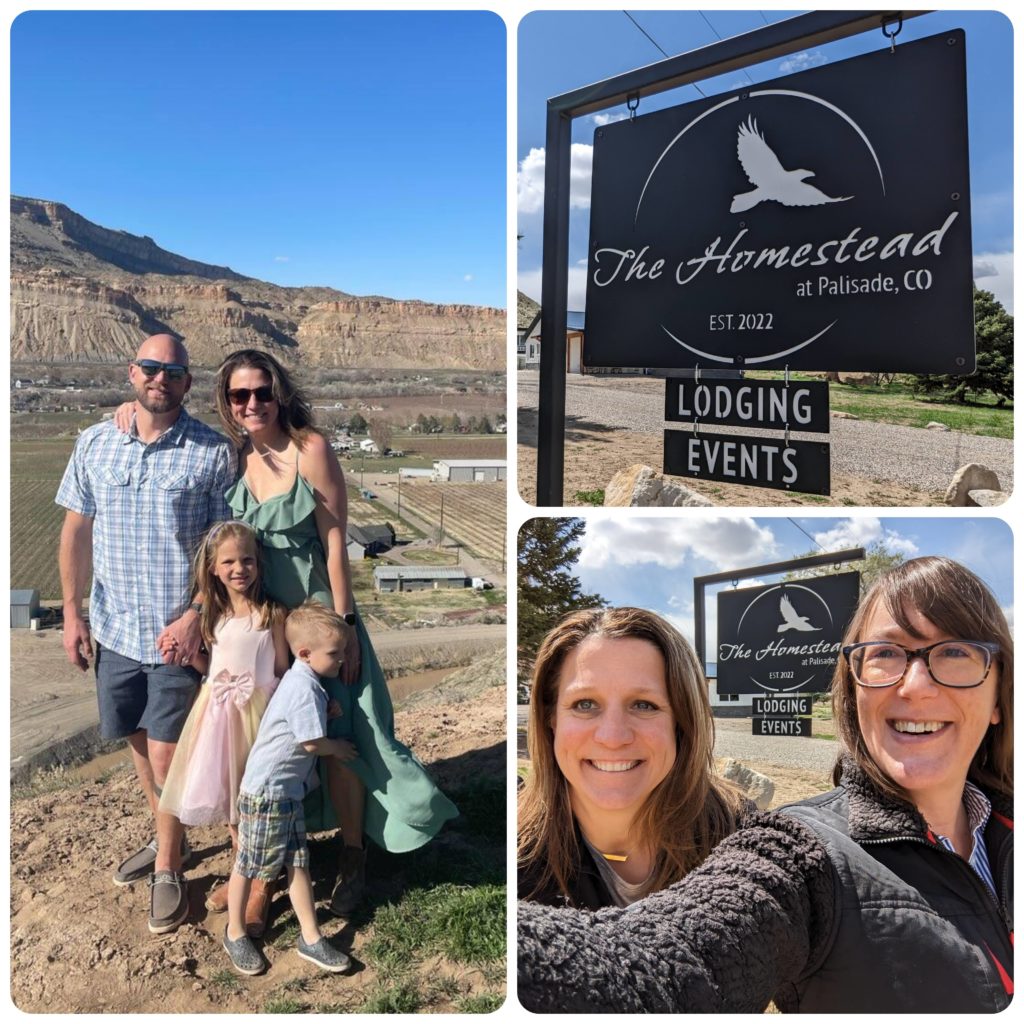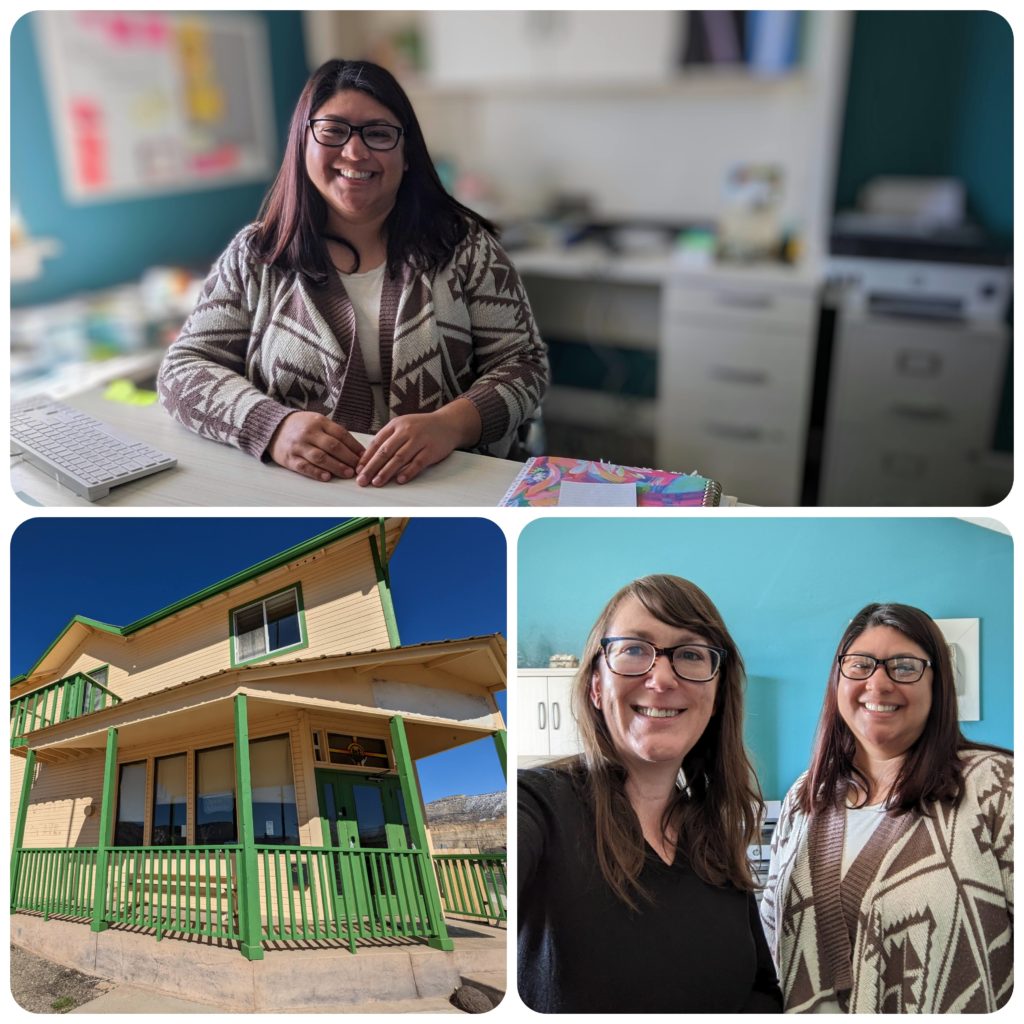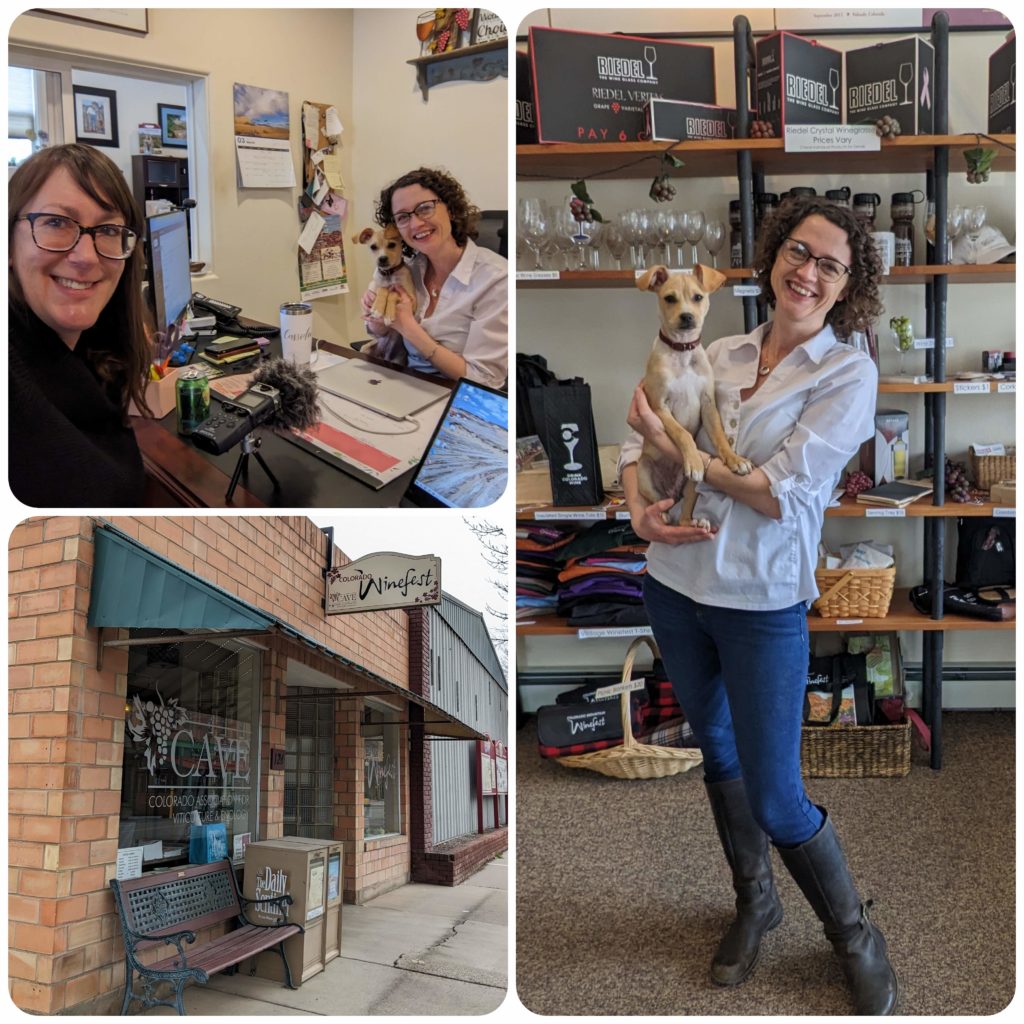How do a cannabis company’s operations differ from other businesses? Why did the Palisade location of The Happy Camper Cannabis Company relocate across town earlier this year? How are they feeling about new competition in Grand Junction?
Whether you’re a regular or occasional consumer or you’ve never touched the stuff, there’s something for everyone (21+) in this episode. We go behind the scenes of a successful cannabis business with The Happy Camper Cannabis Company’s Partner and Senior VP of Marketing and Sales, Colleen Scanlon-Maynard.
For more info about The Happy Camper, check out their website: thcpalisade.com.
Music by Romarecord1973 from Pixabay.
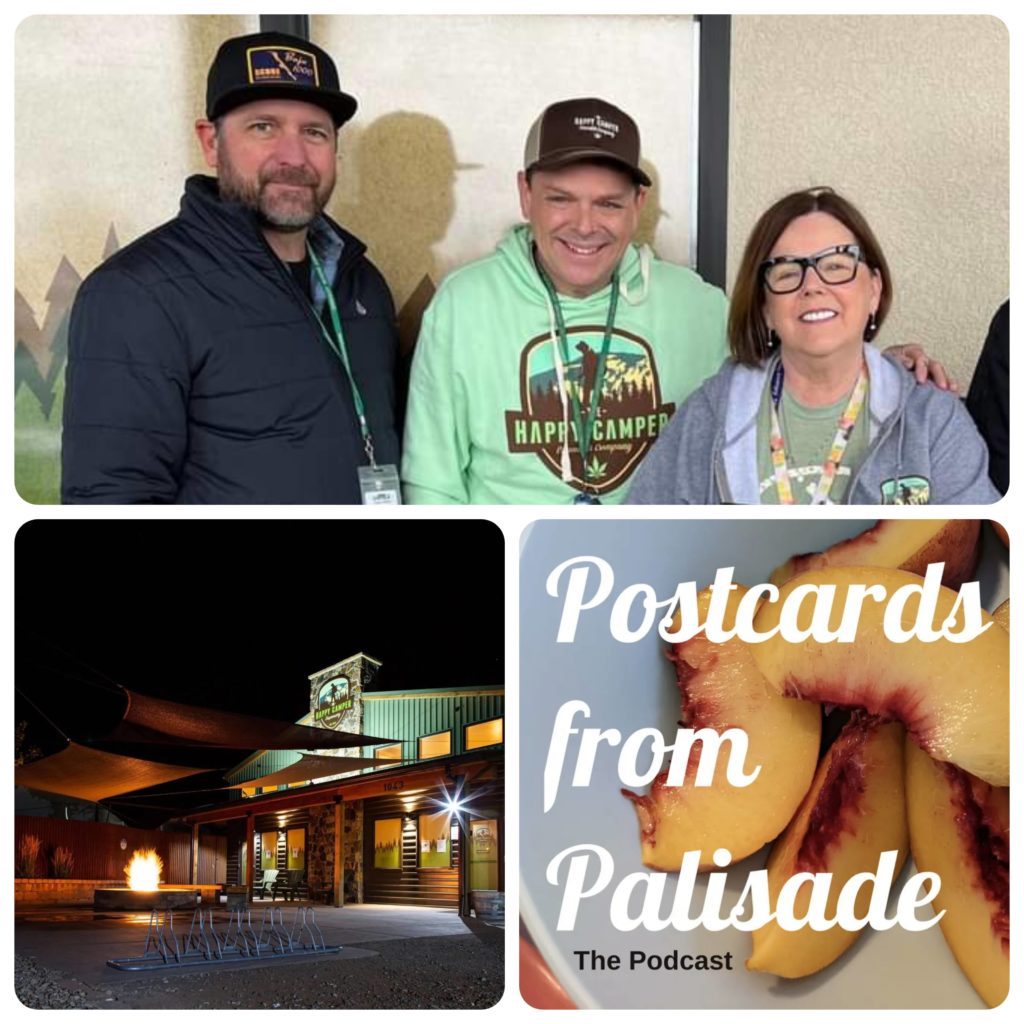
Subscribe:
Transcript:
Welcome to Postcards from Palisade, the podcast that brings you a snapshot of the people and places that make this slice of western Colorado wonderful. I’m Lisa McNamara.
I’m talking today with Colleen Scanlon-Maynard, partner and Senior VP of Marketing and Sales at The Happy Camper Cannabis Company, with locations in Palisade and Bailey, Colorado.
We touch on how Colleen got into the cannabis industry after a career in publishing, marketing and sales, why The Happy Camper couldn’t move as quickly as they wanted when they realized their original Palisade location was too small to support their customers and too big to be a good neighbor, and why their new location is just right.
We also chat about how she keeps customers happy, how important education is for responsible cannabis and CBD consumption, how covid had a huge positive impact on their business, and why they’re not concerned about new competition in GJ. All that and more, on today’s Postcard From Palisade.
Please note, this episode is intended only for listeners who are over 21 or who are listening with a parent or guardian.
LM: this is our first episode recording from the Palisade building so it’s an empty office and it’s definitely echoey but uh would you introduce yourself your name and what you do
CSM: sure my name is Colleen Scanlon-Maynard and currently I’m the senior VP of marketing and sales and then a partner in the happy camper cannabis company
LM: I was going to ask you terminology wise do you refer to it as cannabis industry or marijuana industry
CSM: cannabis
LM: okay cool all right that way I’ll say it right
CSM: I’ll answer to anything either one but we’re the happy camper cannabis company so I typically say cannabis
LM: so what’s the history of the happy camper as a company
CSM: the happy camper started in 2015 it was March and it started in Bailey Colorado and it’s a we have a store and a MIP or a manufacturing plant so it’s a more of a warehouse look than what we have here and the store is on the one end and then the other end is where we receive products it’s more warehouse looking two-story and in the beginning we had the upstairs set up for a grow an indoor grow and then the whole downstairs was just the basic processing and all the different rooms you need for that and then packaging and then the lab
but when my son Dan and my son our partners and have been friends for a long while and so when my son got more involved he decided you know we really don’t need to grow there’s so many grows around let’s just you know purchase trim and so they didn’t they didn’t do the grow and eventually they sold the lights because they had it all set up for a grow they sold all that it’s still set up like a grow upstairs without the lights we sold the lights but um so then we buy trim now we manufacture you know the concentrates and then we have the store okay so that was 2015.
LM: okay and then how did you get to Palisade?
CSM: you want me to go on?
LM: yeah absolutely
CSM: well so I’ve been on for a few years of course and then uh we heard that they were going to be doing a lottery here in Palisade so you know we thought this would be a perfect place for us so we got into the lottery and we won which was nice and uh so then we um it took us a while to get things going here you know we had to get through a lot of things where our location was we had to go and present you know to get it uh just make it doable for us and so we did we built it out beautiful building put a fire pit in made the made it as nice as we could and for as many parking spaces as we could you know planning on what we thought would be the number of customers we would see but we were pleasantly surprised right away and then it just kept growing and growing month after month after month and within just a couple of months
and again this started in 2019 by the time we got open June June of 2019 so we get open and we’re like okay projections we know we’re going to be a little busier than Bailey so maybe again as big you know so if we’re seeing 100 customers we’ll probably see two two twenty well that didn’t happen and so right away we’re seeing more than that then we thought after the grand opening would probably calm down well no we just it kept growing and growing and growing so by I would say end of summer fall we knew we had way out already outgrown where we were you know we were seeing a minimum of 400 customers a day and a high of 550 to six on a day
and so you know they’re parking up and down the road they’re all in our parking lot they’re everywhere you know and so we had already leased property for our employees to park in which was across the road and up in an orchard so we already moved our people we shuttled them back and forth but we what were we going to do with all the customers in the cars and and it ended up the town and the neighbors they didn’t like it and I didn’t blame them and then people weren’t following the speed limit because they had reduced it so we put up signs please follow the speed limit we put the speed limit on there we handed out flyers I put posters in the store but you can’t control when your customer leaves the store what what speed they’re going to do down the freeway or the highway but we did try
so we knew then within months that we this was not going to work so we started then talking about where where we could go in Palisade you know because there’s not there weren’t that many areas where we could actually relocate so we started thinking about it and um over time we knew we had to do it and so we we went ahead and leased a little bit more space um right off the road right in front of the greenhouses so we leased space there and then we leased space off to the other side so we ended up we had like 12 or 13 original spots and then we grew another I don’t know probably got it up to 28 or 30. I don’t even remember now but we did the best we could but it wasn’t going to be good enough so we started really looking for a new location and we knew we couldn’t you know just move we had to ask if we could and then we had to have go in front of the you know the town and trustees and so on
LM: right and that’s because of zoning right there’s only a certain a very very tightly controlled area where you actually could
CSM: well and your license is tied to the location you’re in so you have to get an okay from the you know MED and then after you get that then you have to go to the town and then the town has to look at it and you know figure out where they you know where they’re okay with you going and so yeah it’s a process
LM: extra steps
CSM: it’s a process so it took time and we had to be clear where we wanted to go and it had to work and there had to be enough parking and it we didn’t want it to we knew the number of customers now that we were seeing and it couldn’t be in the middle of you know wine country where people are coming down the road on their bikes and they’re wanting a real relaxed atmosphere and then you run into 50 cars parked all over the sides of the road you know it kind of takes away that ambiance right for the you know the bikers and just you know everybody so we knew we had to do it but we had to be in the right location we’re a retail location we belong where other retail is so that you’re not intruding on a neighborhood or the ambiance of what the town is which is you know peaches and wine
LM: yeah totally makes sense
CSM: so it took time but we we went to work on it and figured out a very good location and then we had to make sure that the town agreed that that would be a good location for us and the good news is they did
LM: how long did that whole process take
CSM: well like I said we started talking about moving probably the fall or early winter of 19 now we just opened in June because we were just unbelievable number of people plus our location was small I had trouble getting room to put my product right because I had to have enough inventory to supply the customers right and our store and our inventory area just wasn’t working so we had to stack product up and we we did it we figured out a way to work it out um but we knew we are just like swelling you know and we’ve outgrown this already
so we started talking about it then I would say after uh probably January February of 2020 we had been in conversation about it then covid which changed everything right and kind of we we slowed down uh really looking at it and we started to figure out how we were going to manage where we were with covid because you know people couldn’t come in we could only have six people at a time we had to space everybody out and so that was our focus which was uh interesting because we had to change the whole way we did business um but it worked and I’ll get into that when you’re ready to talk about that
LM: okay so maybe if not for covid the whole process wouldn’t have taken three and a half years it probably would have been faster
CSM: well it would have taken time because we were in the location we were in for a certain amount of time we had to be there so I think it was a couple of years um I don’t know exactly but the license is tied again to the property and then you’re there for a certain amount of time before you can sell it or you know make any major move so we knew we were there for a couple years but whenever you’re going to move a business you have to plan way ahead of time and then start looking because like I said there there weren’t a lot of areas that were going to be conducive to be better fits right than where we were we were at least on the outskirts of town but the drive in there and the amount of cars and the little bit of parking it just wasn’t working but we didn’t you know we knew we were retail we needed to be where there is retail there wasn’t room for us downtown and there certainly isn’t parking right that would not have worked so you know we really had to just uh you know take our time and look at it but yes it would have probably happened a little quicker
LM: yeah well the location makes so much sense because it’s right off the highway easy to get to people could even walk to it now like before you can walk there there’s no sidewalk there’s no shoulder
CSM: it would be dangerous
LM: right it totally makes sense and what also really cracks me up is your address I think that was that’s really cute it kind of took me a couple of times to get it so it’s 420 Wine Valley Road
CSM: how bout that, huh it just worked out
LM: yeah so now that you’re open there are you seeing a lot more traffic because it’s so much easier to get to
CSM: absolutely absolutely it’s it’s been um really unbelievable because we knew when we moved up there we’d be easier to get to better parking but we just assumed we would maybe get a little more of a bump in in activity but no we’re up probably 30 percent
LM: oh wow yeah so here we go again
CSM: yeah but the good news is we can handle it yeah and and when I get to talking a little bit about covid and how we worked through that which was just uh so interesting yeah it helped prepare us and set us up for what we’re doing today
LM: interesting yeah well why don’t you talk a little bit about that
CSM: well um like I had said we had to do change right change is always difficult you have to go to your employees and you have to start figuring out who’s going to do what because now we can’t have all these point of sales open and everybody on top of each other and our store wasn’t that big to start with so now you have to definitely stay out and wait outside in your cars so I got pagers and I um I had enough pagers for everybody who we we figured would be um online which I’ll tell you about that in a minute um placing orders before they came so they would come to the doors how I envisioned it they’ll come to the door they’ll check in then we’ll give them a pager and then go back to their car or they can sit on the patio in front of the you know in the winter the fireplace or I mean the fire pit or they can in the summer we had misters you know they could just sit out there and wait because they couldn’t I couldn’t have them all in right
so then when the pager went off they’d come back up hand the pager in we check their ID again and and then they would come and I always envisioned at that point the bud tender who would be helping them would meet them at the door greet them and bring them on over and then you know help them well that that’s what I had to put in place but before we got to the point where they did the restrictions to um six people in or you know you had to space them so many feet apart and all that
I already did online ordering I had brought that with me when I came from corporate America so people really weren’t jumping all over it because it was new but we did have probably 20 percent 15 to 20 percent or so of our customers who did it all the time so I sent a text out to all my happy camper fans of which at that time we probably had close to 10,000 of them and I just said if you haven’t tried the online ordering I would try it now because I really think that’s where it’s going to go you know with with covid and all that so um within the text went out one day within just a few days we jumped up I mean people were doing online ordering like crazy it was so good and then within just a few days or maybe it was a week they said um you know put up the restrictions and everything so I was so glad that we got so many more we were probably at that time up to about 60 percent of our customers had at least tried it doesn’t mean they were doing it all the time that we you know but I was getting more doing it so then we sent out a message you know this is how we were going to do it and so we had the pagers already because I’d already ordered them and we started that process
then we had separated everybody out so that when you came in everybody was a good six feet apart so we can only see six people at a time so you look at how many customers we were seeing and you’re going to see six at a time yeah it was really crazy but I broke everybody out into departments in the store this is where I went back to my my team that works with me and I said you know with covid now here’s what we’re going to need to do everybody’s going to order online so now we have to figure out how are we going to pack these orders and we want to make sure when you order if you order in the morning but you’re coming at night we’re packing the order in the morning because my order needs to be there it wouldn’t be fair if I ordered in the morning to come at night and somebody came at two and they ordered and they got my product yeah so we had to figure all that out but we were already doing it so it helped us and I built an inventory department a packing team cashier department customer service department so I could have all the team working together I ordered headsets and this is kind of funny because I said to the team we’re going to be like Chick-fil-A and they’re just like Colleen we do not want to be Chick-fil-A and I said no no I said like them because here’s what amazes me with Chick-fil-A
my grandchildren love to go there so we’ll pull in and you can’t even hardly get in the line and they run two lines you know you’re backed up almost onto the road right but when you get in line it keeps moving it keeps moving it keeps moving and you see specific people taking orders taking the money you go around and you get your product you know your food and you’re out it never stops moving so I was like I wonder how they’re doing that so I started really paying attention and I would go a few times when it wasn’t as busy and you could pull in and there’d be you know maybe four people in line and the one person maybe did two things but then all of a sudden when they start getting busy here they come they have like this team
so I’m like we’ve got to do that we have to have an assembly line like that and everybody has to be accountable for specific things so I did the department breakouts I wrote the job descriptions and SOPs and we all talked about it in preparation for what was coming and then we were doing a little on the fly because it happened then so fast that that four week period I think from the time we had to go online order only and six feet apart we we figured it out and so within a month we had the orders pretty well flowing we had the cashiers doing their thing the customer service people doing the pagers and making sure customers were you know being seen and the order that they checked in um everything was manual then as far as you know who we signed them up and we did it by hand who came into line and all that
well we’ve progressed since then and now it’s all on a tablet and it’s all figured out and now we have a TV screen up that shows you where you are in line you know we’ve we’ve come a long way since we started in 2020 but it was covid and what we had to do to stay in business and be able to serve the customers and serve enough of them because we were able to get them in line and then we saw more and more customers then we moved to the new store our volume is up or we we see more more customers and the system makes it seem like where it’s you know it’s no big deal
LM: that’s so interesting so covid really forced you to really to better kind of structure your operations to handle
CSM: more customers
LM: right more customers or bigger flows of people
CSM: that’s right and we do it now in a way because we can where customers now the store is bigger they can all come back in covid’s over and we have 10 point of sales I open them all every day we have if you want to place an order online you do you get in you get out fast if you want to come in you don’t want to place an order online you want to talk to somebody that’s fine we have four floor tenders bud tenders who work the floor and they’re there to take your order talk you through answer questions show you products
at the older store the original store we really didn’t have a lot of product out on the floor here we do we have our flower displayed we have our gold shelf and our silver shelf flower out so you can smell it it’s in little bud pods and you’re able to you know smell it and look at it and you know make sure you’re getting what you want and then we also have brand of the month and all of that product is there so people can look at it and you know all that and then we have all of our topicals edibles all of those products are along the when you first come in on that right side it’s all there so you it’s all display there’s no product in it but you can pick it up read read what’s in it so you know you actually can have whatever experience you want and then we have a line that’s just for deli flower purchases if you don’t want anything else and you don’t want to order online you can come and get in that line and then you can have somebody weigh the flower right there in front of you you pick what you want so you can have that experience you can get in and out fast if you’re novice we’re going to help you if you just want to come in and get an experience of the whole thing we can do that too
but but the system we put in place originally from covid allowed all this to happen yeah because we saw over uh 420 on 420 the day of 420. we saw 1415 customers in one day and there’s just no way there is no way humanly possible
LM: I can’t even conceive of that
CSM: that I could have ever waited on that many customers in a day without having systems that allowed everybody to have their experience and get the ones who are regular customers who just want to come in and buy their product and move on that’s that experience is there for them and you know we we’re really we try very hard to give a very good service and meet the needs of all the customers and we’re not perfect but we try very hard and we are about making changes and doing what we need to do because the customers are the lifeline of the business and it’s all about customers
LM: absolutely so you mentioned earlier that coming from a corporate background getting into this you brought a lot of your corporate skill set to this position how did you get into the Cannabis industry
CSM: my son Brian is my son and he’s in business he and Dan are in business so he asked me probably about 2017 if I would consult with them a little bit and help put in some infrastructure at the time I was doing I was a vice president of market development for a media company out of Georgia Atlanta and I traveled three weeks a month and then I’d be home a week so I said sure I’ll come out one week a month for a few days and just kind of look at your infrastructure and your marketing and that kind of thing so I started helping out you know and tweaking some things and you know and I really was having fun plus I was working with my son and Dan it was fun
so I did more and more of that you know every month and then after about probably well then the drawing came here and we were gonna they were gonna get this store and I thought you know how could I help with this so I ended up doing a lot of the presentations and things like that and then the fellas just asked if I’d like to you know get involved in the business and become a partner and help them out and at first I thought about it because I hadn’t retired yet you know and then I thought well yeah to work with my son and really get to understand cannabis and um the positives and how it can help people and education which is very important to me because I think there’s a lot of misunderstandings about you know the cannabis industry and the CBD industry so you know I wanted to get involved so I did and it’s been so much fun
LM: what’s it like working with family is it ever challenging
CSM: no I come from family business my mom and dad both own their own companies and and we all as children there’s eight of us in the family sibling I have seven siblings eight kids we worked with my mom and dad and their businesses and um that’s how I got into this corporate job I was working with my dad and his business publishing and they noticed what we were doing and before I knew it you know I was offered a position and I took it you know so no working with family there’s nothing better I love it and working with my son has just been so rewarding and I and I love working with younger you know the younger people so yeah cool and it’s a lot more laid back than I mean there’s a lot of restrictions and there’s a lot of you know things you have to do which are understandable and I get it um but corporate that I was in for so many years is a totally different world and you know it’s more relaxed and I uh at this time in my life it’s nice
LM: this is more relaxed or less so
CSM: oh much more there’s like I said there’s restrictions right but corporate America which I was in and I loved it I did I learned a lot and the mobile technology I brought from there the marketing and sales I learned a lot of that working for my father and my mom but boy I learned a ton traveling I opened businesses in Canada and all over the United States and I learned so much about you know different areas and how to open a business and the infrastructure and I almost like office in a box like I can walk in and I can help you set your business up so that you’re up and running and the good news is you want to be making money so you have to you know look at many different things when you when you start to open a business and um and I got a lot of that knowledge from my family businesses with my parents but really through corporate I learned a lot yeah
LM: right right so I can see how it does apply really well to this industry because marketing is a big component of any business
CSM: it is and in this industry so many of the people that started it in the beginning didn’t have a marketing background or a sales background I’m a sales person that’s where I come from and then you in order to grow sales you have to market so I learned how to do good marketing and I’m constantly if you ever look you will see happy camper is always everywhere yeah I brand it and I market it because it’s a brand and I want people to know who we are then you have to follow through with good service and that’s the sales part you you have to earn the right to have a customer come back you don’t just get it because you have good product you don’t just have it because it’s cannabis and people want it you have the customer come back because you take good care of them and you listen to them and a lot of the changes that we’ve made it’s because I listen to my customers I talk to them actually they um my phone number’s out there they can call me it’s right on our website and any customer who has an issue or concern they can email me and I do respond and I talk to them and I want to know you know if it’s an issue with the way they thought you know the the transaction went or they didn’t like the way they were treated or they want to tell me they loved it whatever it is I want to hear it and then I’m going to make it right
I can’t always change everything but I hear them and I want to make it a good experience for all of them so you have to listen to your customer and then you have to be out there marketing and be in front of them constantly because it’s the best last story they hear is where they’re going to be sure and if you just stay quiet you’re not gonna you’re not gonna you know be in front of the right people
LM: yeah totally makes sense right and the happy camper sponsors so many different things
CSM: yeah we do
LM: so is that like do you are you basically just like I’ll sponsor whatever or do you have criteria
CSM: not really first of all there’s certain things I can’t sponsor if children are involved I can’t okay so I have been asked before to to do some things that just wouldn’t fit um because I’m not going to market this to anybody that’s under the age of 21. it’s a requirement of MED anyway but I wouldn’t do it anyway because it’s just you just don’t do it um so there’s things like the um the Christmas you know when they have the Christmas um
LM: the old time Christmas
CSM: you’re not going to see me with banners and all that no but what I have done in the past has had a basket you know and had people bid on it or whatever with just some CBD in it or something like that gift cards things like that just to support the town or the event but I’m not going to be branding myself everywhere but music festivals absolutely Peach Fest absolutely anything where it’s a draw for a grown-up crowd over the age of 21. I’m going to definitely be there one to support the town because we’re all about the town right that’s why we’re here we love it here and we want to do whatever we can do to help the town and grow and bring more people in and things because when they win we win it’s you know helping each other so we’ll participate in anything that makes sense for our industry and for the people that I’m marketing to
LM: that makes complete sense yeah yeah I saw that there’s a a dinner as part of the peach Fest that looked pretty cool like a CBD Farm to Table dinner
CSM: there is every year I sponsor that this year we’re going to CBD type dinner and what we’re going to be doing is it’s not you don’t have to have CBD but we CBD sponsors the dinner and I have for a couple years but what I’m going to do now is we have a a little um drink you know that we well it’s not a drink it’s like a seltzer water but a sparkling water and we’re gonna be having that up there we’re going to do some mixed drinks with it so we have recipes with different you know options for some drinks so if somebody wanted to try it they could try it there you know now we’re also going to have wine and you don’t have to try that but it would be kind of cool if somebody had never tried it and they wanted to you know there’s no THC you’re not going to get high off of you know drinking a little you know CBD
so anyway we’re going to be doing that and then I’m trying to work it out where maybe there’s an option for a dessert that might have a little CBD you know we’re thinking about that too that’s cool but the main thing is going to be education and fun you know I give away a ton of baskets with all kinds of good things in there it’s all CBD but it’s fun I’ve done it a couple of years and last year it was a blast these two guys won some of the stuff and they were back there you know putting hats on and stuff it was so much fun so this year we should have a really good time with it but I love doing it and just being around you know the people and taking their input listening to them and then answering any questions that we can
LM: yeah it looks like a really fun event um so you mentioned earlier and I don’t know if everybody listening to this would know it but the town of Palisade has a very limited number of licenses there’s two technically two right technically
CSM: technically those two
LM: right and really this was the only place in the Grand Valley where there were retail cannabis businesses and I know you don’t like this question but I ran into Dan the other day at the sneak line and I said what question do I have to ask Colleen um and he said you have to ask her about competition and I was like I know she doesn’t like that question cause when we talked on the phone you were like I really don’t like this question but I also really liked your answer to it too so I have to ask you now that Grand Junction is opening up uh you know they opened up the lottery for the 10 licenses I think this time
CSM: oh yeah yeah it’s done
LM: there yeah yep and so that’s in progress there’s going to be 10 new competitors in in the valley um what’s your plan to to kind of compete with those new businesses
CSM: well the part of the question that I had been given prior to this that I didn’t care for was are you worried that you’re going to go out of business oh because of the competition
LM: that is a distinction that’s different for sure
CSM: absolutely and what I said back was absolutely not competition is healthy everybody needs competitors you stay you’re better and you work harder when you have competition so competition doesn’t I like it it doesn’t bother me at all what I will say about what’s going on on in Grand Junction we wanted a license we went for one we weren’t drawn it’s the luck of the draw there was nothing we could do about that but what I can do is continue to do what I’m doing I believe in marketing staying in front of the customer being the last best story they heard having the best prices carrying the best products and giving the best service and being able to meet the needs of all customers so again my work my flow to be able to have online orders in and out as quick as possible in-store orders take as much time as you’d like flower only orders come in and have it weighed out in front of you you can smell it you can look at it you can pick what you want you do have to wait in line but we have one or two depending you know stations running the bud pods are there and then I have all the displays you’re going to get whatever experience you want and I’m going to make sure our service is exceptional and when we fail I take care of the customer you have to do that
so I think that we’ll take a little bump I mean hit I know we will that’s okay um but I think if the customers you know we have many many VIP members who have been with us I told you we had about 10,000 happy camper fans I call them and they come into the store at least once or twice a quarter some of them weekly but on an average these VIP members are once or twice a quarter that’s a lot of customers that come and go that have learned to really appreciate the happy camper and the brand now is the competition going to draw some of them in to check it out sure it is and that’s okay um they’ll like some of the ways they do their business they’ll love some of the products they have they’ll like some of the sales they have so that’s fine I’m hoping that we continue to have them come back for these special things that we do in the special like we do clones now and we’re doing them on a couple like every other month basis that’s something new nobody in the valley is doing and um you know we’re just going to have a lot of fun things I want to have some outside activities you know maybe during the summer during some big pop-ups or like Fourth of July 7/10 and I’m kind of working with the peach Shack to maybe do a little farmer market out front just some fun stuff you know outdoors and I just think we’re retail we are all about customers and I hope that they’ll they’ll really see that as they embrace some of these new businesses to come in to see you know maybe what the happy camper brings to the table and has no matter you know when we’re doing business it’s going to be the same customer comes first can’t always do everything they want you to do but you listen and you do
the best you can that’s all we can do and marketing I’ll be doing and I am and I will continue to do a lot of that and um I think the service and the products and all and we’ll be fine and I wish them all well I want them to do well
I think a lot of the ease off and on the freeway is is a positive for us um you don’t you know what’s spread out all over town if it’s convenient for the people living there I get it I would go to the corner store too as long as the sales were good and the product’s great why not you know and I and I know that’ll happen I’m not worried about I-70 traffic because we’re so convenient and currently we’re getting so many new customers right off of the freeway that I think that will continue s
o you know the move absolutely yeah it’s going to be very beneficial but no competition is fine with me and I just know who my competition is and they’ll know who we are and we’ll you know we’ll compete but it’ll be a friendly competition you know
LM: I love it no competition definitely drives me too like it keeps you I think it keeps you motivated it keeps you creative yeah yeah thinking always thinking ahead and not getting stale
CSM: always and that’s how I do my business anyway so all this does is just excite me more to be a little more progressive moving the ball forward doing more for the customers and you know just continuing to better the training for the people that work with me so that we are spot on every day what happens in the store now is you know if we’re if it’s a day where I see 900 customers okay on a Friday or a Saturday my team is boom boom boom we are on it everything’s great you know when it slows down and it’s a day like let’s say on a Monday where I saw 550 customers they think my team gets bored they’re like yeah oh Colleen it was really slow today I heard that yesterday and I’m like we saw 550 customers guys but it’s because you have those laws and they’re used to this super fast pace so what I am working with them is to stay as attentive to the customer and engage with them come out from behind the cash register talk to them before you know bringing them to the station to do the warm and fuzzy greeting like we did at the other store where you met them at the door you know so we’re working on that now that’s huge to me and we need to warm it up a little so that’s the thing I’m doing this week working with my team to to be just a little bit when we’re slower a little more engaging with the customer prior to them coming to the cash register not the ones that are being waited on by a floor tender but people that have ordered online or after they’ve ordered with the floor tender bring them up to the counter talk to them about how their day is going or whatever just you know we embrace the customer now let’s talk a little more you know to them during that time that doesn’t when we’re busy boy they’re bringing them up come on up let’s get going now but when it gets like only three people or four people in line they’re not as apt to so we’re always working on getting better always
LM: that’s awesome yeah um so just a broader question about the cannabis industry in general like what what do you think legalization has done for the state of Colorado and towns like Palisade
CSM: well one the um the revenue the tax revenue I just know what we generate and um it’s really I know it’s helped and that’s good that’s a positive um I also think that it’s kind of softened the way people think about cannabis I think cannabis got a bad rap over the years you know and people kind of put it together with heroin and all these very heavy drugs that are super dangerous and now you kind of put it out here on its own and let’s talk about what it really is and education you know do children need to drink alcohol no do children need to smoke cannabis no but what they do need is education as to why they shouldn’t right and if we just say no it’s bad no it’s terrible well they’re going to do it you’re encouraging them to try it something really bad that sounds like fun you know and I think if we did more education on alcohol with young children and I say young children anyone under 21 and cannabis what it is what its benefits are and when your brain has developed enough to not be damaged by the use then you make a decision whether you would want to try it for you know recreational or health benefits or whatever but if we just did you know if we want to just say it’s taboo and we want to just put it over here and rank it up there with a lot of other super heavy drugs you’re gonna you’re gonna lose because kids are going to try it so I’m I’m all about education and I think it’s helped is it where it should be no but we’re going to get it there and it’s going to be by talking about and communicating you know with it
now just like alcohol some people can have a drink some people can’t cannabis is the same way there are people that shouldn’t use cannabis I don’t care how old they are there are some people that shouldn’t drink either no matter how old they are there’s that’s never going to really change but the education of young people making better decisions decisions with good knowledge and not just no is I think going to help them make better decisions as young people and that I think it is it is helping um we got a long way to go
LM: yeah and that’s a challenge too because in your position you can’t necessarily do that because you know it or how how could you do that or how does that
CSM: educate the young people
LM: Yeah
CSM: by educating the parents
LM: okay
CSM: and um and in my world I’m educating my grandchildren and this is one thing my son said to me when I was trying to decide whether I was going to get into the business or not he brought it up and I go oh I don’t know you know I have grandkids so I don’t know that that and they’re young and I don’t know that that would be good and and he just said to me you know Mom do you drink wine in front of the grandkids yeah do you talk about it I go well yeah I tell them when they’re old and I talked to him about it why it’s not something that they can do right now and why I don’t say it’s terrible I just said right now at your age it would not be good for you your brain’s developing and this and that um he goes well wouldn’t you want to do that about cannabis and talk to them so they’ll talk to you about it and I go wow I never thought about it
so guess what that perfect thing happened I was in the car talking to a customer and I was taking my grandson to a futsal practice and he is he was 14 at the time he’s 15 now okay and I’m like happy camper can I help you and I’m answering some questions and this is every week I take him once a week so this goes on because I told you I talked to customers all the time well one day I got off the phone in the car and he goes Nana that’s that’s what they call me he goes uh nana I know what business you’re in and I go you do and he goes I do I go well what business am I in and he said you’re in the cannabis business and I said you’re right how’d you find that out he goes well I heard you on the phone and then I asked Dad you know his dad my youngest son and he told me and he explained to me about it and everything and he goes you know what Nana some of the kids in my class he was an eighth grader at the time yes freshman or eighth grade already tried he called marijuana marijuana and I said really what do you think about that and he goes well I just don’t think it’s good because you know I’m playing soccer and futsal and I have a lot going on and and you know like my dad said my brain is still developing see I mean he was thinking and he and I had a conversation that we would have never had and all the way then to practice we talked about it and it was such a good conversation this is how children will learn from their grandparents and their parents making them understand why if a child understands why they’ll make a better decision but when you just say no it’s bad or it’s this or that that doesn’t do it kids want to know why
LM: yeah absolutely
CSM: so I think those are ways that we’re making it better we got like I said we had a long way to go yeah but it’s getting there
LM: where would you like to see things be in the industry in like five ten years
CSM: I’d like to see it be legalized all across the country I don’t understand why it isn’t
LM: yeah it’s complicated
CSM: it’s complicated um education get it out there talk about what it really is about explain that some people will never be able to use cannabis just like they’re not able to drink but there’s a lot who can and what about I I have an awful lot of customers who call me and thank me and this is just as many in the CBD world that are getting off of opioids and they’re healthier and they’re and they thank me they go this is great thank you so much for helping us that that’s why I’m there that is huge and for more seniors who have you know arthritic pain or different type inflammation or they can’t sleep they just can’t sleep my husband is one of them who is just struggles terribly and when you can help them you get a big I don’t know what I do without it thanks so much and I didn’t have to take a synthetic drug that is not good for my body those are all positive things so these are all the things that I think if we can legalize it across the country and start to speak about it educate people and be real about it it’s going to be helpful you know
LM: absolutely
CSM: any other questions from Dan
LM: no that was the only one I said I said just give me one that was the one he said
CSM: well he knows I love my competition so he’s just wanting to hear me say it again you know
LM: he’s like you gotta get that answer you know I thought it was cute he also said thanks for talking to you well
CSM: yeah thank you
LM: of course is there anything you feel like I missed about the business that you’d want to kind of share with other people or
CSM: what I would say about the business one that surprised me and I hit on this earlier a little was the lack of marketing the um feeling that you didn’t need to do it that if you had it they would come and you’re just wasting your money I was shocked by that because I again I come from that business knowing that it doesn’t matter what your product is there’ll be competition and you have to stay in front of the customer so I never did understand that I didn’t listen to it and I I did it anyway um from the moment I started working with Dan and Brian I was marketing it marketing it and more and more all the time and then the same for um embracing technology like this new mobile technology texting out to your customers getting them to agree to take a text you don’t text them all the time you text them things they want to know about specials and things that matter you don’t just blast all this stuff to them to annoy them but you send them good things that they like and like we run specials if you’re a VIP reward member 4/20 was on Thursday so I sent a text out and said hey VIP members you can come in the day before on 4/19 and get all the specials for 4/20 and that way you don’t have to wait in line and you’ll be so proud yeah well that’s the benefit to them for being a VIP member you get the same specials just come on in and we’ll take the sale price we’ll give it to you this day so we got a lot of people doing that I do it on green Friday my VIP members I send them a message they come in on the Wednesday before Thanksgiving they get all the green Friday or Black Friday specials so they have it already done they don’t have to wait in line they can enjoy their family why not that to me is a thank you to the customer but it’s all marketing and branding and using the technology to benefit the customer your customer these are the ways the way I see winning the loyalty of a customer is when you do special things for them and you care about them
and one other thing too was the um you know a customer comes into the store and they buy a cartridge they spend fifty dollars they go home and it leaks okay so when they’re trying to use it it’s running into their mouth okay that’s not good the product’s got a problem so I take it back I’m not going to have someone spend fifty dollars and then when they tell me it’s got a problem oh I’m sorry that’s that’s a shame yeah yeah no I have an agreement with my vendors if they’re going to do business with us if there’s a problem with their product we have to take it back destroy it because legally you have to destroy it immediately which we do consumer waste we take care of that we have a special bin everything goes in it’s logged the minute it comes in with all the receipts the original and the return receipt
and then we charge them a penny and then we give them the new the same product just a new one hopefully will not be leaking or whatever and then we destroy the one they return and um and that all gets sent over to metric and all that so we take care of that end but we’ve taken care of the customer too and that happens you know especially in the cartridge world they they do have some issues sometimes and I was surprised to hear some people tell their customers no you know
LM: yeah because that’s a kind of an investment
CSM: well that’s a match yeah what do you mean though yeah I just bought this and I can’t even use it right you know so I try very hard to put customer first and do the best I can now do some people sometimes try to take advantage of that yeah and I can’t we can’t do it you know but overall customers customer service taking care of them that’s the key and then following the guidelines to do it properly is what matters and uh and we do all those things so
but those were the two things that you would ever tell a customer no right you know you just spent that and you just left my store an hour ago and I’m going to say you know too bad well I wouldn’t come back to your store if that’s the way I was treated so to me you take care of that customer and then you follow through with the right process to handle it you sell it to them for a penny because you can’t give it to them of course and then they’re happy and everybody’s happy
LM: so you split your time between a few different places
CSM: I do
LM: and so when you are in Palisade what do you like to do here
CSM: oh my goodness well I’m a wine girl so I definitely go to the to the wineries I have a really good friend who owns a vineyard and she’s the winemaker Juliann and I love her and her wine and so
LM: oh I was there for the first time this weekend
CSM: did you like it
LM: it was awesome I loved it they are very good
CSM: and what’d you think about all her the way her place is set up
LM: it’s so cute
CSM: isn’t it adorable and it’s so just Colorado like when you see it you’re like yes this is where we are and I love the little handkerchiefs around her all the little touches that she puts into her location and her you know wine tasting room and yeah
LM: and the wine’s good too so it’s not just oh it’s cute the wine is also really good
CSM: it’s great and what happened I joined her wine club because she can ship or does ship to my state so I get it you know every time she’s doing that I get it and then Colterris I love Colterris and I’m also a member of their wine club and a couple of the others so I’m a wine girl I love I love the you know doing the wine and um to be totally honest um I work while I’m here when I’m here it’s about my team and what I need to do to help them to get us where we need to be and keep us where we need to be right for the customers I go out and talk to the customers on the floor I love what I do and um
LM: that’s awesome yeah it just really shows through too
CSM: I do I get a kick out of it and I love customers and I love chatting with them and and thanking them you know letting them know how much I appreciate their business and it’s so amazing when I had a call the other day there was an upset customer I can’t even remember what what it was about and I called him right away you know and he goes well I can’t believe you called me so quickly and I said well of course and I helped him and he was so just shocked that you know an owner would call him and I said well why wouldn’t they for sure they would I said and you keep my phone number and if you ever have an issue or a concern or you just want to share something with me or you have a product that you’d like to know if we could want to carry text me or call me I’m fine with that so when you enjoy what you’re doing you work a little and the rest is kind of like your hobby you know you do it because you get great pleasure
and and the young people that work with me mentoring them the way people mentored me as a young person I wouldn’t be where I am today if I hadn’t had so many people take me under their wing and help me so I’m paying it back with these uh great young people that I’m working with to build careers the ones who want it some some don’t want a career but the ones who do I’m doing my best to try to mentor them and help them so that they can build nice careers for themselves
LM: that’s awesome
CSM: so yeah it’s fun
LM: oh that’s so cool well thank you so much for your time I’ve taken up a lot of it but I really appreciate you taking the time to talk to me and um yeah I think it’s it’s just a it’s an interesting conversation it’s interesting to hear your perspective about um just how you think about the business and what excites you about it
CSM: yeah well it’s a great industry and it’s going to go a long long way we just have to keep being progressive in our thinking and moving it forward because in the end it is a business it’s retail you’re either wholesaling it to your people that are going to retail it out it’s a retail business that we’re in here in Palisade and the goal is to make happy customers so that you continue to you know do business there you go
LM: well thank you so much
CSM: thank you
LM: I was really excited to learn all about the cannabis business from Colleen – it was something that felt like a big mystery to me, going into this conversation. But what I came away with was: it’s just a business, like any other! Granted, a highly regulated business. But for the most part, the tips and ideas that Colleen shared can be applied by any savvy business owner to improve their own operations.
And Colleen has such a passion for business, no matter what that business is. After I hit stop on the recording, she sat with me for another fifteen minutes or so and we talked all about podcasting – my goals, competition, how it all works. I really should have kept the recorder running, but I kept expecting her to have to dash out the door, onto the other twenty things she had to do that day. But with me, like she describes being with her customers and employees and family, she was so generous with her time.
Thank you for spending some time with me.
If you’d like to be on the podcast or you have an idea for an upcoming episode, I’d love to hear from you. You can reach me at lisa(at)postcardsfrompalisade.com.
The Postcards from Palisade podcast is available on all major podcast distribution platforms. Except soon, we’ll no longer be available on Stitcher, since that app decided to shut itself down as of August. That was actually my favorite podcasting app and I’m going to miss it. Find us and subscribe on the other platforms so you never miss an episode. Latest episodes and links to more information are also posted on the website postcardsfrompalisade.com.
Thanks for listening. With love, from Palisade.
